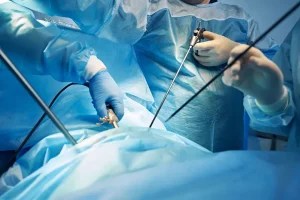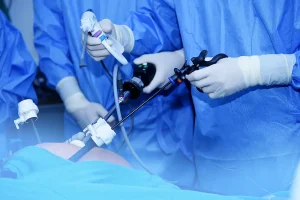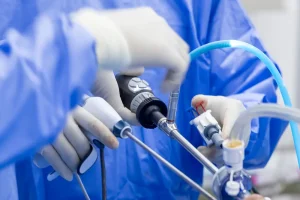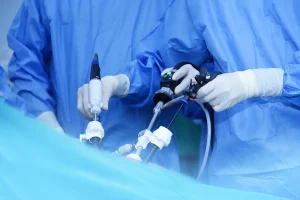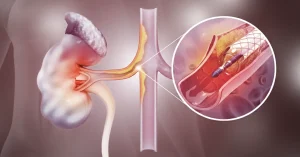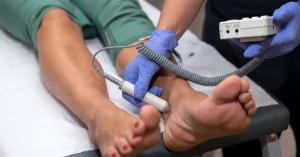What is Gastric Sleeve?
Gastric Sleeve is a form of bariatric surgery used for weight reduction. During the procedure, roughly 75% of the stomach is surgically removed, leaving behind a narrow tube or “sleeve”. This drastically reduces food capacity. Patients feel full after eating only small amounts, which makes it possible to lose weight quickly and effectively.
How is Gastric Sleeve Surgery Performed at Our Clinic?
At VenArt Clinic, stomach reduction surgery is performed laparoscopically — a minimally invasive method that uses small incisions instead of large open cuts. The procedure removes the outer portion of the stomach extending from the esophagus to the gastric antrum, following the lesser curvature.
Modern medicine has advanced this approach into what is now known as laparoscopic longitudinal gastrectomy, a cutting-edge technique that represents one of the safest and most efficient methods in bariatric surgery.
What Medical Conditions Does Gastric Sleeve Surgery Treat?
Gastric sleeve is more than a weight loss tool — it also addresses serious obesity-related health issues. The procedure is recommended for patients who already suffer from complications due to excess weight or who are at high risk of developing them.
Conditions that may improve or completely resolve include:
- Insulin resistance and type 2 diabetes;
- High blood pressure and hypertensive heart disease;
- High cholesterol (hyperlipidemia) and vascular disease;
- Non-alcoholic fatty liver disease and steatohepatitis;
- Sleep apnea and obesity hypoventilation syndrome;
- Joint problems and osteoarthritis.
Is Stomach Reduction Surgery Safe? Advantages and Disadvantages
The risks of gastric sleeve are significantly lower than the long-term dangers of untreated obesity. Compared with other common surgeries (such as gallbladder removal), complication rates are lower.
At Clinica VenArt, we perform the procedure laparoscopically, meaning fewer incisions, reduced pain, and faster recovery.
Advantages
- Provides rapid and effective weight loss;
- Reduces risks of serious obesity-related diseases such as diabetes, heart disease, and stroke;
- Less invasive than gastric bypass — no cutting or rerouting of the intestines.
Disadvantages
- Rapid weight loss may result in loose skin;
- Standard surgical risks apply, including bleeding and infection;
- The procedure is permanent — the stomach cannot be restored to its original size.
Why Choose Gastric Sleeve Instead of Gastric Bypass?
Gastric Sleeve is one of the most widely performed bariatric surgeries, largely because it avoids intestinal rerouting. This means fewer nutritional deficiencies compared to gastric bypass, as food absorption remains closer to normal.
Another advantage is its effect on ghrelin, the hunger hormone. By removing the stomach area responsible for ghrelin production, patients often notice a marked decrease in appetite. Combined with reduced stomach size, this makes it easier to maintain long-term weight loss.
For patients seeking effective, permanent weight reduction without the complexity of bypass surgery, Gastric Sleeve offers the best balance between benefits and risks.
How Much Weight Will I Lose After Gastric Sleeve?
Within the first 12 months, most patients lose 50–70% of their excess weight. For example, someone weighing 130 kg could realistically reach 50–60 kg within a year, achieving a healthy, normal weight.
Weight loss usually averages 4–5 kg per month, provided post-surgery medical guidelines are followed.
What Does Gastric Sleeve Surgery Cost at Our Clinic?
The cost of a laparoscopic gastric sleeve at VenArt Clinic is typically €5,000–€6,000, with most associated fees included.
Prices may vary depending on the surgeon’s expertise and clinical setting. Contact us to receive a personalized estimate.
Does Insurance Cover Gastric Sleeve Surgery?
In some cases, yes. Certain health insurance providers will cover part or all of the costs, especially if the patient has medical conditions linked to obesity (such as sleep apnea, diabetes, or cardiovascular disease) and if prior weight-loss attempts through diet and exercise have been unsuccessful.
Insurers usually require medical documentation to justify the surgery.
What Are the Possible Complications After Gastric Sleeve?
While any surgical procedure carries risks, laparoscopic gastric sleeve performed at VenArt Clinic is considered safe, with complications being rare.
Potential risks include:
- Bleeding during or after surgery;
- Infections;
- Venous thrombosis;
- Gastric stenosis or narrowing;
- Gastric fistula;
- Vomiting if overeating or eating unsuitable foods in the first 2–3 weeks;
- Headaches or dizziness.
These are generally short-term risks. In the long term, gastric sleeve surgery carries minimal complications when performed by an experienced bariatric team.
Is a Post-Surgery Diet Required?
Yes — following a structured diet plan is mandatory for proper healing and long-term results.
Immediately after surgery, only liquid or soft foods are allowed, gradually progressing toward a balanced diet. Patients must adapt to smaller portions and prioritize nutrient-dense foods, since the reduced stomach size limits intake.
The goal of this tailored diet is twofold:
- Support stomach healing after surgery;
- Maximize and maintain steady weight loss.
If you want to learn more about the diet after gastric sleeve surgery, you can read our article on the diet after gastric sleeve surgery.
Medical Consultant: Dr. Bogdan Amza


